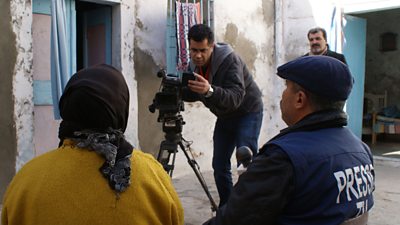Downloads
Publication date: April 2013
Summary
- As part of the British Foreign and Commonwealth Office’s Arab Media Partnership project, �鶹Լ�� Media Action works with the national broadcaster Télévision Tunisienne to support its transition to a public service broadcaster.
- Audience research demonstrates that the post-revolution media in Tunisia continues to struggle to win the trust of the audience.
- Practitioner research indicates that the first year of this project has already led to improvements in practitioners' knowledge, skills and attitudes.
- Project work and accompanying research will continue in the project’s second year.
Context
Following elections in October 2011 and the formation of a new government, the momentum for change and expansion of media freedom in Tunisia seemed set to continue. However, the media sector remains in a state of flux; the Instance Nationale pour la Réforme de l’Information et de la Communication (the temporary independent body charged with reforming media in post-revolution Tunisia) has expressed concerns at the government’s lack of initiative and criticised ongoing interference in the media.
The project
Over a 24-month period, �鶹Լ�� Media Action is working with the public broadcaster to build the country's public service broadcasting capacity. In particular, it focuses on supporting the production of participative programming outputs to a high editorial standard. Programmes will cater for audiences that are currently under-represented, for example marginalised and unemployed youth, women and girls, to enable them to participate fully in the democratic transition.
Through a targeted training and development programme, the project works to ensure that Tunisian TV has capacity to produce programming that a) adheres to public service production values and b) caters for the needs of its national and local audiences. The main project beneficiaries are media practitioners including senior managers, editorial leaders, journalists and programme makers at Tunisian TV and audiences across Tunisia.
Research methodology
This is a mixed method research and evaluation project designed to inform the production of new programmes, demonstrate the value of understanding its audience to Tunisian TV staff and management, and measure any impacts of the intervention on audience members. Research methods include: audience research (focus groups discussions, a nationally representative survey and in-depth interviews with senior media stakeholders), practitioner research (post-training surveys, in-depth interviews and analysis of training reports), and content analysis of programmes.
Findings
This research summary is based on data collected during the first year of the project from audience focus groups, practitioner interviews, management interviews, stakeholder interviews and trainers’ reports. The Tunisian audience has a high expectation of public service broadcasting, but they report via focus group discussions that these expectations are not yet being met by either by the public broadcaster or any other media in Tunisia.
Gaining the public’s trust is public media’s biggest obstacle in Tunisia. Managers at Tunisian television report that immediately following the January 2011 revolution, “the biggest challenge… was changing people’s perception of the media and gaining credibility, the trust of the viewers” (senior manager at Tunisian TV). Yet data collected from audience focus groups conducted in November 2012 reveals that the Tunisian audience feel that the media still has vested interests: “each channel works for the interest of specific people, the public TV works for the interest of the government and the private channels work for the interest of their owners” (male, urban, under 30 years old).
Truth is very important to the audience; audiences report that the media in Tunisia “manipulate”, “change”, “hide” and “exaggerate” the truth. They worry that “the media is not representing the truth; it changes the information for the interest of some people” (male, rural, over 30 years old). Practitioners meanwhile argue that the media is trying to be truthful, they just need more support and training to learn how: ‘‘Media should follow, direct, and make the truth clear… these truths are pointed out through investigative media and journalism, which is lacking some experience in Tunisia, as are the journalists” (journalist at Tunisian TV).
The need for training is recognised by everybody concerned with the media in Tunisia, as one producer at Tunisian TV explained: “media in Tunisia is only two years old. Two years and a bit… you need to teach it things like a newborn baby”. This was confirmed by the �鶹Լ�� Media Action trainers’ situational analysis, which identified a range of areas for improvement including leadership and teamwork, as well as role-specific skills. In addition, a number of interviewees commented on a ‘lack of professionalism’ within the post-revolution Tunisian media. At this midway point in the Media Action project, reports from trainers reveal that for most participants, knowledge, skills and attitudes are improving following the training. However, all trainers emphasise that trainees are often starting at quite a low point and increases are “a work in progress” (trainer, a political debate programme).
Implications
The findings at the end of the project’s first year point to Tunisia’s difficult media landscape as a result of the post-revolution transition period and difficulties winning audiences’ trust. These factors have meant that dramatic improvements to the development of public service broadcasting in the country have been difficult to achieve. However, the research also shows that the project’s initial phase has already made significant progress at the practitioner level, which will be built on in its next year. Perhaps most significantly at this stage, most practitioners and managers show enthusiasm and willing for continued development, and data will be collected throughout the coming year to monitor how this translates into further improvements.
